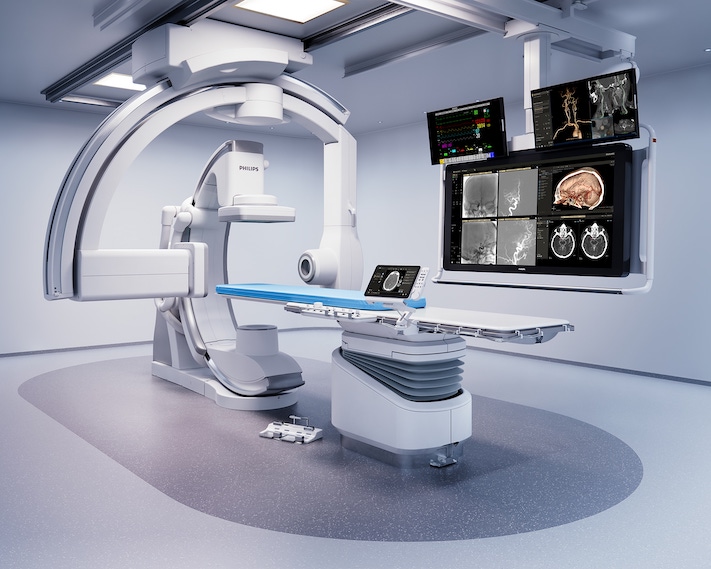Philips Introduces Next-Generation of Azurion Neuro Biplane System at ECR 2024
Images

Royal Philips announced major enhancements to its Image Guided Therapy System – Azurion – with the launch of its new Azurion neuro biplane system. Designed to streamline neurovascular procedures and help care teams make the right decisions faster, treat more patients, and achieve better outcomes, the new interventional system features enhanced 2D and 3D imaging and X-ray detector positioning flexibility. As healthcare providers strive to deliver high-quality care to patients, at ECR 2024 Philips is partnering with its customers to improve productivity and access to more sustainable healthcare.
Minimally invasive procedures enabled by interventional systems like Azurion are a key part of the diagnosis and treatment pathway for stroke, where every minute counts in conserving the patient’s quality-of-life. Interventional systems are also used to precisely plan and carry out complex neurovascular procedures such as the repair of brain aneurysms and birth defects. By allowing neuro interventionists to treat more patients, more efficiently, with potentially better outcomes, the new Philips Azurion neuro biplane system enhances both the staff and patient experience and contributes to lower cost of care.
“Working closely with leading interventionists, we designed the latest Azurion neuro biplane to meet their requirements of superior patient care, optimized angio suite performance, and efficient return on investment,” said Mark Stoffels, Business Leader of Image Guided Therapy Systems at Philips. “Together, I am confident we can continue to reduce the impact of stroke, helping more patients to recover faster and reducing long-term impact on their health.”
Philips’ Azurion neuro biplane image-guided therapy system is designed to smooth and optimize procedure workflows where a combination of 2D and 3D imaging is needed for confident diagnosis and precision treatment. Used with the company’s latest Neuro Suite software and services, it provides neuro interventionists with a fully integrated solution that combines Philips’ world-class ClarityIQ low dose imaging with a range of neuro dedicated tools* and value-added services that offer unprecedented levels of efficiency, flexibility, and control.
New features in the Azurion neuro biplane system include enhanced C-arm rotation, angulation (imaging angles), and parking facilities that allow rapid transitioning between 2D to 3D imaging, comprehensive table-side control that eliminates the need to leave the sterile field, automatic beam rotation to obtain correctly oriented images for every angulation and rotation, and a new head immobilizer to support enhanced stroke care.
In addition to the efficiency enhancing features of its Azurion platform, Philips is maximizing the up-time of its angio suite solutions by using AI and machine learning to monitor system performance through the new remote connection services of the Philips ServiceHub. These services communicate, monitor, and proactively respond to potential service issues – for example, predicting likely component failures at least seven days in advance so that pre-emptive action can be taken.